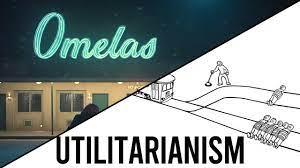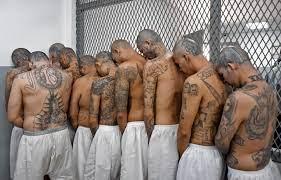In an Ursula LeGuin sci-fi tale, the inhabitants of Omelas all live very nicely. All except one: an innocent child in a cell suffering torture. That’s the price for all the others’ good lives. They know it, and pay it. (Or accept the child paying it.)

Utilitarianism is the moral philosophy valorizing “the greatest good for the greatest number.” Positing that a world in which there’s more pleasure and less suffering, in toto, is better than the opposite. So in Omelas. But a Kantian critic would reject this as simply wrong. Morally wrong to sacrifice one person for another. Or even a million others.
El Salvador elected Nayib Bukele, now 42, president in 2019. The country was plagued by vicious gang crime, predation, and violence. Bukele declared a big crackdown, locking up anyone even suspected of gang affiliation. An anonymous tip, or just a suspicious-looking tattoo, would suffice. Fair trials? Ha ha.

Since March 2022, 71,000 Salvadorans have been packed, nearly naked, like sardines, into overcrowded prisons. That’s 7% of the male population aged 14-29. There are no plans to free any of them anytime soon.
Crime rates have fallen dramatically. Before, the populace was terrorized by gangs. Too scared to ever refuse extortion demands, or to report such crimes, because no one would dare testify against the gangs. Now, when a mere anonymous phone call can land you in jail, it’s the gang guys that are terrorized.
They might inspire little sympathy. But of course, a lot of innocent people have been swept up too. They might be seen as the equivalent to the Omelas child. A price the Salvadorans seem willing to pay, to live in greater safety. For most of them at least.
The crime reduction has sent Bukele’s popularity and approval through the roof. This he’s capitalized upon, to deploy a typical panoply of tools to yank out democratic checks-and-balances, to make his authoritarian power unassailable (and likely irreversible) — bending parliament, the courts, etc., and hobbling any dissension or criticism. Polls show he is the most popular leader in the region.

Bukele might also evoke Thomas Hobbes’s “Leviathan,” a powerful state arbiter protecting society’s members from predation by their fellows. Hobbes wrote in a time of kings, vested with very great powers indeed; but more enlightened societies have evolved to protect citizens from the threat posed by such powers as well.
Thus the tradeoff in Omelas, or Bukele’s El Salvador, is not one inevitably forced upon us. We can live in a society ruled by reason and law, where we all have rights, protecting us against abuse from both the state and rapacious others. That’s the true utilitarian solution.
Bukele already calls himself “the world’s coolest dictator.” No dictator is cool. When will we ever learn?
